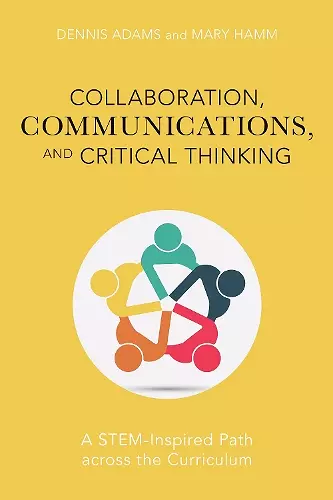Collaboration, Communications, and Critical Thinking
A STEM-Inspired Path across the Curriculum
Dennis Adams author Mary Hamm author
Format:Paperback
Publisher:Rowman & Littlefield
Published:10th Apr '19
Currently unavailable, and unfortunately no date known when it will be back
This paperback is available in another edition too:
- Hardback£67.00(9781475849981)

This book makes a case for a STEM-based approach across the curriculum by highlighting the potential impacts of rapid societal change, newly emerging information technologies, and the increasing demand for a new generation of skillful and well-rounded citizens and workers. The book discusses how thinking skills, collaborative learning, communications-related information technologies, science and math, language and literacy, and arts education can be used as mutually reinforcing instruments in preparing young learners. The role of the family, teachers, and school administration in creating an environment where young students can stand a chance is also articulated. Above all, the book reiterates the value of pedagogically attuned teachers who are sensitive to the diversity of backgrounds and capabilities of students. They will oversee and guide the transformation of young learners who will be trained to trust their creativity, humanity, and critical thinking skills in navigating the 21st century world.
In an era of fake news, screens everywhere, and the latest device, digital literacy is more important than ever for students of all ages. While technology has many benefits, it also has distractions from the traditional classroom and the tried-and-true ways of learning. Adams and Hamm show the research that striking a balance between the old and the new is the best way to create multi-literate students in our increasingly complex world. With sample lesson plans on STEM subjects, technology, literacy, and the arts, Collaboration, Communication, and Critical Thinking is an innovative approach to embracing technology, but sticking to the old foundations and basics of learning. -- Taylor Weinfurter, Youth Services Librarian
In their new book, Collaboration, Communication, and Critical Thinking, Adams and Hamm explore he benefits and limitations of using technology from the science classroom to the arts classroom. Providing many examples and learning activities that are ready for use, the authors stress the need for teachers to use student-centered not technology-centered decision making to create a climate of achievement in the classroom. While using the best of technology, teachers are empowered to create environments of change that encourage enthusiasm, energy, teamwork, and creativity. In those environments, students can be guided by parents and teachers to take an active role in their own learning. -- Luann Okel Adams, Wisconsin Teacher
Collaboration, Communication, and Critical Thinking analyzes the philosophical underpinnings of science, technology, engineering, and mathematics (STEM) education and provides practical approaches and strategies to create transformative learning experiences. This book describes a vision of education that can serve as a catalyst for practitioners interested. In exploring skills and activities that nurture growth mindsets, social learning, inquiry, teamwork, and innovation. It is a must read for those who believe in American philosopher John Dewey’s assertion that teachers should not be teaching what to think, but rather how to think. -- Martha Kronholm, professor, Saint Mary’s University of Minnesota
Thoughtful research-based insight into the importance of carefully integrating digital technology in the classroom to enhance critical thinking and problem-solving across the curricula, without compromising literacy and creative use of language. -- Karen Seyffarth, French Immersion Teacher, Nova Scotia
This book truly addresses the vital qualities to be cultivated by teachers and students in a technologically-intensive world. It enlightens us on the cognitive, creative-thinking and communication skills which are key for the 21th century educational environment. It illustrates how communication technologies can be used in the fields of arts and sciences. Adams and Hamm explain how the strengths and opportunities of the digital age can be connected to enhance the teaching profession. Through this enriching text, I have learned how to implement social and collaborative strategies in the classroom. -- Bhavish Ramlochun, Teacher, University of Mauritius, Ebere, Mauritius
ISBN: 9781475849998
Dimensions: 222mm x 152mm x 14mm
Weight: 277g
188 pages